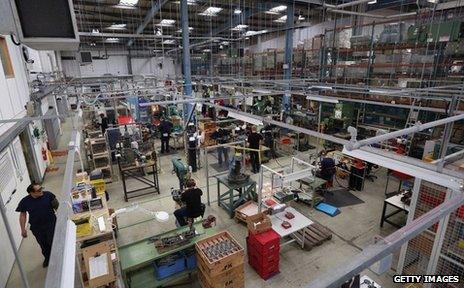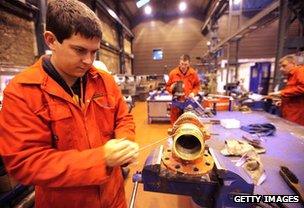It's trade or bust for Britain
- Published
- comments

Tuesday's survey by the British Chambers of Commerce, which indicates that overseas sales of goods and services by UK companies may be recovering a bit faster than expected, matters a good deal.
Here is the reason.
If the symptom of Britain's disease is excessive debt - households, government, business and banks which have collectively borrowed record amounts, and more than is healthy or sustainable - then the disease itself is that Britain hasn't paid its way in the world for decades.
Or to put it another way, Britain has for 30 years been buying more from other countries than it sells to them. And aggregate UK debt cannot fall until that gap is closed.
So the imperative if we are to get out of our malaise, most would argue, would be to narrow and eliminate the intractable current account deficit.
Which is why, as Stephanie Flanders pointed out last week, official figures on what happened to the UK's current account deficit in 2012 were both shocking and disturbing.
Because far from this important imbalance being rectified, as the government hoped and expected would happen as a consequence of the persistent weakness of sterling, the UK was a net borrower from the rest of the world last year to the tune of £54bn, up from £17bn in 2011.
In the jargon, the current account deficit was equivalent to 3.7% of GDP in 2012, which - as Stephanie mentioned - is bigger than at any time since 1989. This was only the fourth year since 1948 that the current account deficit exceeded 3% of national output.
Here is another way of thinking about this. Households, businesses and banks in the UK are all saving more, because of their collective conviction that they borrowed too much in the boom years. That rise in saving has depressed domestic economic activity. And because that economic activity has not been offset by increased sales to the rest of the world, the whole British economy has failed to recover, which is why tax revenues in Britain have been much lower than the government hoped.
In other words, Britain's inadequate export performance can be seen as at the heart of all our present difficulties. There is, for example, a link between the failure of British exports to grow as expected and the persistently high level of government borrowing - because austerity, or controls on government spending, has failed to keep pace with the weakness of tax revenues.
There is, of course, a huge and important divide between the government and the Labour opposition about whether this means austerity should be ratcheted up or eased off.
The prevailing view on the right is that there should be deeper spending cuts to match the lower tax revenues. The evaluation on the left is that this would simply depress economic activity and tax revenues further, and would do nothing to slow down the escalation of the UK's national debt, except in the very short term.
If that is the battleground for the most important political argument of our time, both sides would agree that the whole business of closing the government's deficit, and indeed returning the economy to something that looks altogether healthier, would be helped enormously if only those blessed foreigners would buy more of our stuff.
So why hasn't trade recovered?
What should give policymakers in the UK some pause for thought is that in Ireland and Spain, two economies which are locked into the euro and therefore don't have the benefit of an exchange rate which can adjust to their national economic conditions, there has been significant recovery in their respective current account deficits.
In both countries, but particularly in Ireland, there has been savage devaluation of an internal sort - wages and livings standards of workers have been slashed to a far greater extent than in the UK, which has improved the competitiveness of their businesses.
That said, the competitiveness of British companies has been improved by the prolonged fall, since the great crash of 2007 to 2008, in the value of the pound. So why aren't British businesses selling massively more?
Given the improved trade performance of Spain and Ireland, it is not a sufficient explanation to blame the depressed conditions in the eurozone.
My conversations with companies point to three problems.
First is that Britain's biggest manufacturers tend to be global companies with what are known as global supply chains. Or to put it another way, the British-made bits of the products they make represent only a small amount of the overall cost of those products. And when sterling falls, as it has done, the cost of raw materials and overseas-manufactured components rises.

Too few apprentices leads to a shortage of skilled workers, say manufacturers
So for some British-based global companies, a fall in sterling isn't the boon it is cut out to be.
Second, official statistics showing that the finances of British companies are incredibly healthy may be misleading. Anecdotal evidence suggests that for every company sitting on a fabled mountain of cash, there are several others anxious that they are too indebted. So rather than taking advantage of cheap sterling to shift vastly more product and invest to increase capacity, they are increasing their dollar prices to widen their profit margins and boost cash flow.
Finally there are significant supply constraints on those companies wishing to sell more.
For example, I recently had a striking conversation with Michael Morris, a director of a precision engineering firm in north-east England called Chirton. This is a smallish manufacturer with a great story to tell. Founded in 2003 with a staff back then of just five, today it employs 51, has turnover of £2.8m, and has sold components to China.
Here is the thing. Chirton simply can't find sufficient numbers of skilled people to hire, to keep pace with the demand it is seeing. So it is turning valuable orders down. Which is pretty depressing for them, and not particularly cheerful for the rest of us.
Now, all three problems tend to indicate that the hollowing-out of British manufacturing in the decades before the 2007-8 crash is perhaps more serious than the official statistics would tend to indicate.
It is not just the 30% shrinkage in manufacturing's share of national output - to about 10% - during the last decade of the boom that has done damage.
At the same time, the structure of manufacturing and the British economy changed, such that its ability to respond quickly to increases in demand has become more limited.
This doesn't mean there can't be a serious revival in manufacturing. But such a revival can't be desperately fast. It would require big cultural and economic reforms, such as a significant increase in numbers of teenagers choosing apprenticeships rather than higher education, and a return onshore of the kind of component makers that have fled to Asia.
All of this is achievable in time. What is unclear is quite how much time Britain has.
Here is the corollary of that unfortunate nexus between weak trade and unsustainable high government borrowing.
There will come a moment when investors who are currently prepared to lend to the British government at record low rates of interest will begin to question whether those interest rates properly capture the risks of lending to a country with a persistent inability to pay its way in the world in the broadest sense, with persistently low growth and with tax revenues that continuously fall short of squeezed government spending.
Or to return where we started, everything - including the government's ability to avoid a serious financial crisis in the coming years - hinges on whether the BCC is right that an important recovery is underway in British overseas sales of goods and services.